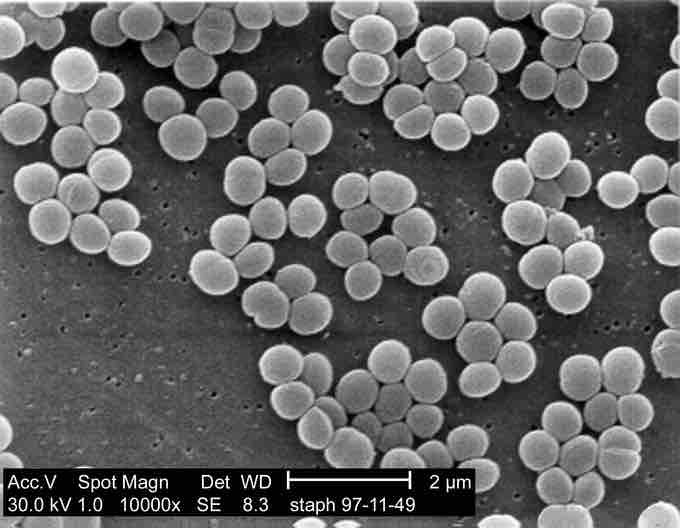Staphylococcus is a Gram-positive bacteria which includes several species that can cause a wide variety of infections in humans and other animals through infection or the production of toxins. Staphylococcal toxins are a common cause of food poisoning, as they can be produced in improperly-stored food. The main coagulase-positive staphylococcus is Staphylococcus aureus. These bacteria can survive on dry surfaces, increasing the chance of transmission.
Typhoid Fever
Rose spots on the chest of a patient with typhoid fever due to the bacterium Salmonella typhi
Any S. aureus infection can cause the staphylococcal scalded skin syndrome, a cutaneous reaction to exotoxin absorbed into the bloodstream. It can also cause a type of septicaemia called pyaemia. The infection can be life-threatening. Problematically, Methicillin-resistant Staphylococcus aureus (MRSA) has become a major cause of hospital-acquired infections and is being recognized with increasing frequency in community-acquired infections.
Foodborne illness usually arises from improper handling, preparation, or food storage. Good hygiene practices before, during, and after food preparation can reduce the chances of contracting an illness. There is a consensus in the public health community that regular hand-washing is one of the most effective defenses against the spread of foodborne illness. The action of monitoring food to ensure that it will not cause foodborne illness is known as food safety.
Foodborne disease can also be caused by a large variety of toxins that affect the environment, such as pesticides or medicines in food, and naturally toxic substances such as poisonous mushrooms or reef fish. In the past, bacterial infections were thought to be more prevalent because few places had the capability to test for norovirus and no active surveillance was being done for this particular agent. Toxins for bacterial infections are delayed because the bacteria need time to multiply. Their symptoms are usually not seen until 12–72 hours or more after eating contaminated food.

Staphylococcus aureus
Staphylococcus is a Gram-positive bacteria which includes several species that can cause a wide variety of infections in humans and other animals through infection or the production of toxins.